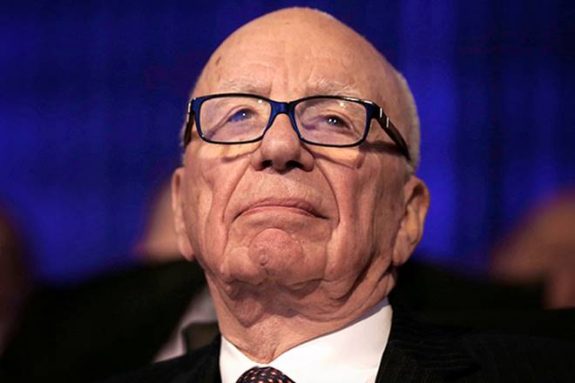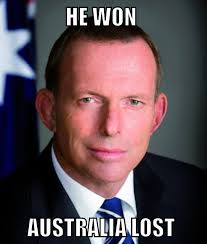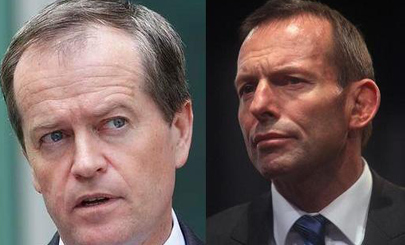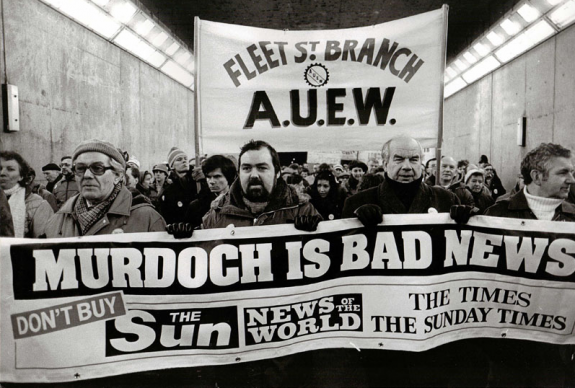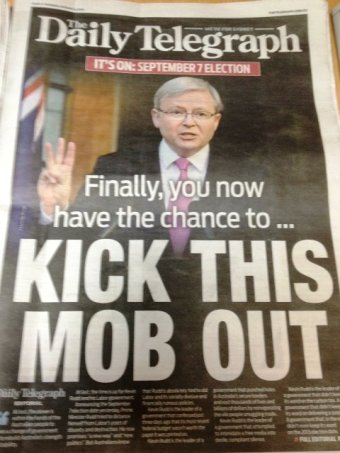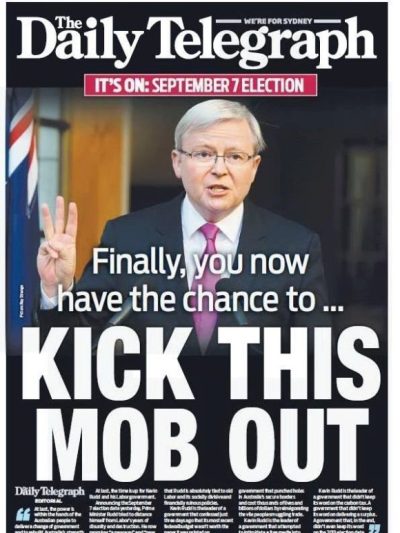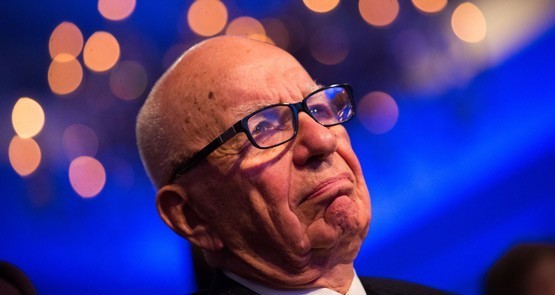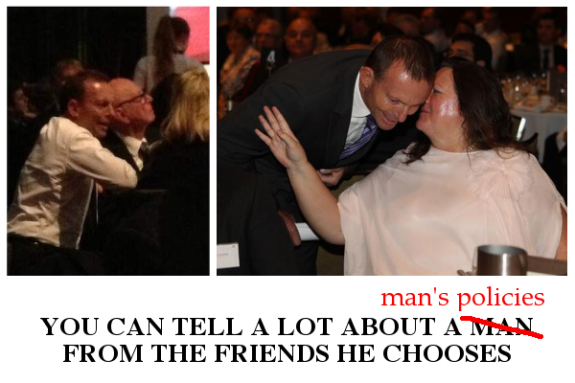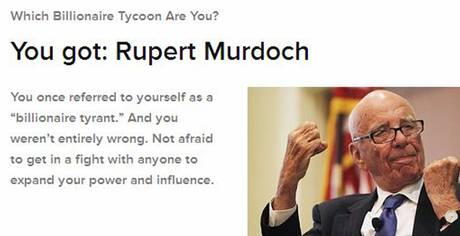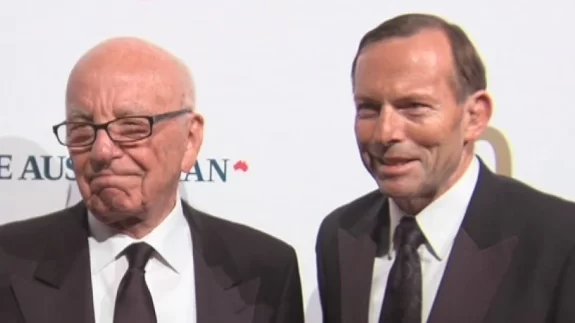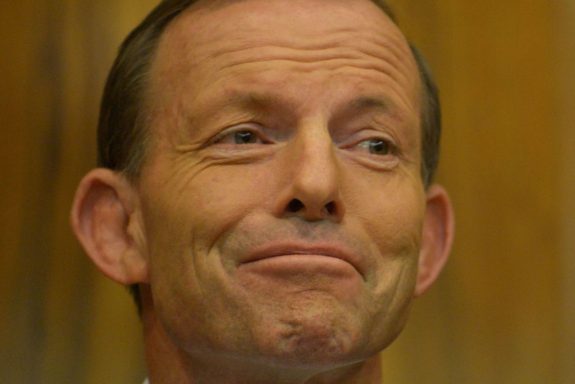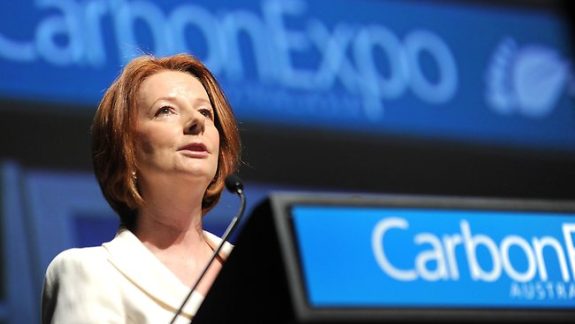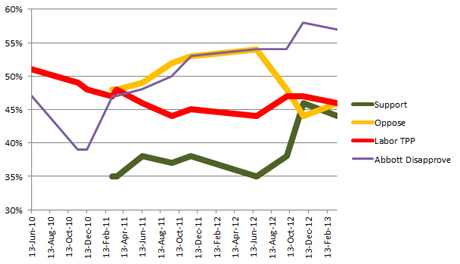There’s been a lot of noise in certain corners of the media about Rupert Morlock Murdoch and his opposition to the NBN in Australia, which translates to his pulling out all the stops to bury the Australian Labor Party’s chances of electoral victory. It is unknown whether he will be successful in this effort. It’s certainly possible; by the American model of politics, it is possible to buy elections, and he wouldn’t be using such prime broadsheet real estate if it wasn’t at least somewhat effective. It’s also unclear whether the sudden ramping up of hysterical anti-Labor rhetoric is specifically due, as Fairfax posits, to a fear of the NBN’s commercial impact upon Murdoch’s cash-cow, Foxtel, or simply because News Ltd papers have been steadfastly against Labor since day one and the announcement of an election was a bait they couldn’t resist. But let’s, for the moment, accept the former proposition: this is all about the NBN and Foxtel. What a great excuse to examine the potential benefits of the NBN under Labor’s FTTP model.
(Technical note for lay people: FTTP = Fibre to the Premises – wherein NBN Co foots the bill for not only laying optical cable along every street, but also for wiring it to your property, like your current fixed-line telephone cable. Assuming you have one, which is no longer a given in the modern age. The Coalition’s alternative will run the cable along the streets, but it will terminate roughly on each street corner, and if you want to use it you’ll use a connection between your existing copper phone cable and the closest Node to your property, with physical limits on the speed that you can achieve over copper, even assuming it to be in good condition. Alternatively you can pay for optical fibre to be run from the node to your premises, at an estimated cost of up to $5000… ahem. Enough proselytising: we’re here to talk about the plan as it exists now, not the hobbled version of a Coalition future. The costs of the two models, and the technical merits thereof, are beyond the scope of this post.)
Detractors of the government’s FTTP NBN model often make the claim that its primary uses will be for “more interactive gambling or more movie downloads” (Tony Abbott: 2011, and just about every comment troll on this subject, everywhere, ever.) The image invoked is of greasy-haired teenagers in their parent’s basements, only pausing from downloading Game of Thrones and playing World of Warcraft for a quick spot of pornography before moving on to the next map in Counterstrike. If that were all that the NBN offered, I would find myself hard pressed to justify the investment too. (Although I wouldn’t make the continued mistake of calling it a massive waste of taxpayers’ money, seeing as taxpayers are actually not paying for it.) But as some have said, the NBN is a case of “build it, and ideas will come“. We don’t know the majority of uses the NBN will eventually be put to. They haven’t even been thought of yet. We need to have the capacity before people will start thinking of the opportunities it will offer.
That said, it is reasonable to use the leading edge of technology practice today to make some informed guesses about the technological directions that might be in use in the world of tomorrow. A lot of the ideas that follow are already here or just on the horizon. I’m also looking specifically at uses that will affect the everyday user in their suburban home, rather than offices; the need for fast broadband in office buildings is pretty much a given. When the accusation is made that all uses of the NBN will be for trivial purposes, it’s couched in terms of homes, so let’s focus specifically on that environment.
Entertainment
Let’s start with Tony Abbott’s “more interactive gambling or more movie downloads”. It’s certainly one area where current users can benefit from the increased bandwidth on offer from Labor’s FTTP model. The Coalition must have a few MPs with streaming foxtel, because they are certain that “25MB per second will be more than sufficient for most users”. But obviously their MPs haven’t upgraded to UltraHD TVs, which have four times the resolution of standard HD. Personally I’m not intrigued, but if television that eats 25MB/s is already available in the stores, I’m not taking a bet that the next generation of entertainment devices (perhaps holographic? Smellovision?) will require significantly more again. And yes, faster bandwidth means faster downloads of torrented material as well as the legal stuff. But this is hardly forward-looking.
Videoconferencing and telecommunications
Most top ten lists of NBN uses talk about e-Health. Some also list e-learning. A few might talk about videoconferencing. It all boils down to the same thing: long-distance high-speed communication with pictures. Whether it’s high-def imagery of a mole or a wound so your doctor can make an informed decision, or streaming the operating theatre so the surgeon can remotely control the robot arm that’s taking out your appendix, or interactive whiteboards and teleconferencing with your teacher, the possibilities of this use alone are endless. Imagine what today would be like if we were still restricted to the telegraph. That’s how today is going to look from the perspective of the future. (Note that unless someone has a really bad morning before drafting legislation, video content on your phone calls will still be optional in the future.) Videoconferencing is already here and in wide use in business circles. As an IT professional, I can attest to the poor quality currently offered even in an office equipped with high-speed current-generation broadband. At its simplest, this is because the quality of the communication depends upon two things: the quality of the connection for every participant, which is why ubiquity of service is important; and the upload bandwidth available. Most current “broadband” uses a technology that gives reasonably fast download speeds to your computer, but much slower speeds on upload back to the internet. For most internet use this isn’t a problem, all you’re sending is small requests for content. But in videoconferencing, you’re sending as much data as you’re receiving, and current technologies don’t cut it. The NBN is a symmetrical technology, meaning that your upload speeds can be as fast as your downloads, so now the person on the other end of the call can see and hear you as well as you them.
The Internet of Things
This current buzzword refers to internet functionality being built into all kinds of household devices. There is a trend in this direction, with entertainment devices leading the charge, but being followed closely by refrigerators (new models which can maintain an inventory of contents and automatically order replenishments when stocks are getting low) and remote household control of lights, central heating, and checking if you left the oven on. Electricity and water smart meters will require connectivity. Your answering machine will be video capable, connected to your front door camera, and available to stream the video of the Jehovah’s Witnesses leaving that pamphlet on your doorstep despite your “no junk mail” signs. It’s even feasible that you might be able to answer the door or your home phone while you are in the office. None of these applications will require huge amounts of bandwidth or speed, but taken together they add to a low level noise that is always on.
Telecommuting
Many people currently work from home. In an ever more connected world, where workers in many fields are continually mobile and supplied with laptops and tablet computers, the maintenance of a dedicated office may become more and more an extravagance. But there are limitations and hurdles to overcome, not least being the requirement for home workers to have access to the resources they need. Often these resources are tangible – computers, printers, phones. But these things can be purchased and are increasingly simple to support and manage from a central location. More difficult are information and data resources.
Internet bandwidth is already a limiting factor for many teleworkers. Architects need to regularly download, work on and then re-upload plans and diagrams. CAD operators, 3D modellers, graphic artists – these creative or information-reliant jobs are the kinds of jobs most suited to working from a remote location, but also the most reliant on the traffic of large amounts of data. Some workers currently migrate from rural areas to the cities in order to acquire the bandwidth they need. Others simply give up on teleworking and base themselves in an office, with all of the impacts on travel time and work/life balance that this entails.
Again, it is upload speed that is often the killer. Information workers and creative experts often spend many hours building, drawing, sketching or designing highly detailed outputs, creating very large files. Hard disk space is cheap. Your personal computer is more than powerful enough to data-crunch rendered 3D animated scenes with aplomb. But getting the resulting terabytes of data back to the office is where it all falls down. The NBN to your home will allow you to send those files back to your office in blinding speed, allowing you to download the next set of files and get back to work quicker. The only thing that suffers under this proposal is your spare time to play with your children while you might have otherwise been waiting an hour for the files to finish uploading.
One of the downsides of teleworking is the lack of presence with the team. This is another area where the NBN will unleash potentials. Multi-party videoconferencing with collaborative editing of a document is currently the reserve of advanced companies within their offices. In the future, being at home will be no barrier to being a part of the team brainstorming session or the design project team.
The future of computing
All of the above ideas are currently in practice to some extent. Some are in use in business which can afford the bandwidth and equipment requirements. Others are in their first stages of development into the domestic market. But all of them will benefit from increased investment and phenomenal increases in usability and functionality once they are adopted much more widely. Now we can start to think a bit more ambitiously.
Software as a Service (SAAS)
Recently Adobe Software discontinued the production and sale of boxed versions of their software applications. They are part of a growing trend towards digital distribution of software. But this is old-school: you still install the software on your local hard drive and from that point you run it from your own computer. Even if it requires always-on internet (generally not received very well in internet-challenged Australia) it’s not really SaaS.
Microsoft’s Office365 offering is a much better example of consumer-level SaaS. If you have a license for 365, you can open, edit and save Microsoft Office files from your cloud storage on a computing device with nothing but an internet browser. This includes your Android tablet, internet kiosk computer, or your iToy of choice. You can even use your touchscreen phone if you’re feeling masochistic. The web server does all the work of generating the interface and accepting your commands. There are clear benefits for users in the freedom from dependence upon a specific computer; all you need is an account and an internet connection.
Office365 is late to the game, of course. Google Docs has been doing this for years, allowing users to create, edit and share word processed documents, spreadsheets and other files in the cloud. The recent Chromebook computers that the search behemoth has brought out don’t include an operating system to run Office, Pages or other traditional software. They rely entirely upon internet-served software including Google Docs. Clearly, local hard drives and installed software are not a big part of the future Google sees.
In addition to sending and receiving your working files, though, this model requires regular transmission of the data that forms the applications you’re using. As more and more software companies make the switch to serving their application through the web, rather than requiring installation, fast broadband will become ever more important.
Platform as a service (PAAS)
The logical extension of SaaS is Platform as a Service. PaaS spells the end of the computer as we know it. The idea is driven by the need for control and standardisation. As any IT systems manager knows, IT management is largely a matter of disaster prevention. Computer users have a long and proud history of installing anything and everything on their computers, up to and including a file for showing cute pictures of cats, named “Cat-Haxxor-lmfao!1!.exe”. In order to prevent this, or to easily repair the damage once it’s occurred, large organisations adopt Standard Operating Environments: a set of accepted software from operating system to installed programs. Anything else is not allowed to install, and if disaster strikes it’s easy to wipe the slate clean and reinstall the whole package.
The NBN will allow large companies to control the systems environments of their employees, in the office or at home, by streaming a new copy of the whole package every time you log onto your computer for work. Employees will only be able to log onto the work network with an appropriately controlled and safe computer. With the NBN, a home-based Australian employee of a US company will share exactly the same operating environment as everyone else in the organisation.
It’s not too much of a stretch to see this concept extended beyond the realm of work; where Microsoft or another company will offer a complete virtual computing experience. Windows 8 is already moving down this path; you log on to the computer using your Microsoft account, and your account is synchronised between any Windows 8 computers you log into. When this happens, it really will be the end of the desktop PC. It will probably also be the end of laptops and possibly tablets as well. Why carry a screen with you, when any surface can be turned into a desktop? When every house and every office and every shopping centre has connected terminals that you can log into to stream either your work environment or your personal (play) environment? The recent remake of Total Recall, despite its various flaws, showed this kind of computing future. It may be another thirty years away – it equally might be less than ten. But it won’t happen in Australia if we don’t have ubiqitous fast broadband.
Haptics
What’s video conferencing and ultra-high-definition holographic entertainment without utilising the sense of touch? There is already plenty of work being done in the area of touch feedback. From sensory gloves to complete virtual reality systems, the ability to add vibrational and motion feedback has good potential to be a major part of future computing. But touch feedback, like video conferencing, requires fast data transmission in both directions: a remote computer needs to sense what you’re doing pretty much instantly and feed back the appropriate response. A delay of even a few milliseconds may be enough to break any suspension of disbelief that working on a remote machine may require. Fast broadband will make all sorts of things possible, from remote driving of mechanical suits in hazardous areas to fine motor control over surgical instruments, to virtual reality and, naturally, a revolution in the experience of online pornography.
3D printing and fabrication
Domestic 3D printing is all the rage these days. 3D printers use detailed CAD plans to build physical objects using a substrate – often a kind of plastic. The technology has been in development for well over a decade, and is now reaching the exponential stage. What are now large, expensive and fiddly machines and processes will become ever smaller and faster and more useful over time. It won’t take too long before 3D printers will be available to buy at Harvey Norman, and not too long after that potentially even embedded into wearable devices. The possible uses of 3D printing are still being discovered, but could easily include assembly parts (from tools to clips and screws; from panels to electronics), 3D models, even musical instruments. People have succeeded in printing their own weaponry. For some kinds of online shopping in the future, you won’t need to wait for delivery; you’ll instantly download a 3D plan and send it to your printer for fabrication. Once again, scads of data transmission is required for every downloaded plan, and if the technology takes off it will add to the ongoing demand for bandwidth.
While we’re talking Star Trek technology, let’s go one step further. If transporter technology is ever developed, it will entail disassembling an item (or a person) at one location and reassembling an exact replica at the destination. Whilst the actual method of accomplishing this is still unknown, you just know that it’s going to require the near-instantaneous transmission of quintillibytes of data. Believe it or not, there are people currently working on this kind of technology. If they succeed, it will be decades before it becomes commercially available. But the thing about the fibre cable that forms the NBN is that it won’t be outdated; it will likely still be around and in daily use.
The future is an exciting place and the technological possibilities seem endless. But life and society will increasingly revolve around fast, ubiquitous, and always-on network connectivity. Labor’s NBN sets Australia up to be a part of this, and potentially to be a leading developer of the technologies that will shape the lives of the next generations.
First posted 9/8/2013 on the Random Pariah.
Like what we do at The AIMN?
You’ll like it even more knowing that your donation will help us to keep up the good fight.
Chuck in a few bucks and see just how far it goes!
Your contribution to help with the running costs of this site will be gratefully accepted.
You can donate through PayPal or credit card via the button below, or donate via bank transfer: BSB: 062500; A/c no: 10495969

